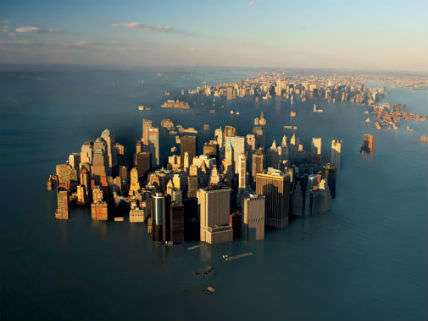Sea Level Is Not Rising Faster Than Researchers Previously Thought
Despite alarming headlines to the contrary

The United Nations Intergovernmental Panel on Climate Change's (IPCC) Synthesis Report released just last November concluded:
Over the period 1901–2010, global mean sea level rose by 0.19 [0.17 to 0.21]m (Figure 1.1). The rate of sea-level rise since the mid-19th century has been larger than the mean rate during the previous two millennia (high confidence). It is very likely that the mean rate of global averaged sea-level rise was 1.7 [1.5 to 1.9] mm/yr between 1901 and 2010 and 3.2 [2.8 to 3.6] mm/yr between 1993 and 2010. Tide-gauge and satellite altimeter data are consistent regarding the higher rate during the latter period. It is likely that similarly high rates occurred between 1920 and 1950.
Global mean sea-level is increasing according to the IPCC because glaciers are melting on land and the added heat from man-made global warming produces thermal expansion in the oceans.
A new study published in Nature this week, using models incorporating fancy new statistical techniques, finds that the IPCC has slightly overestimated the rate of sea-level rise during most of the 20th century. This new study has provoked some interesting headlines. For example, the Washington Post reports, "The rate of sea-level rise is 'far-worse than previously thought,' study says" and The Independent warns, "The tides are changing: Sea levels rising at faster rate than predicted, study finds.
The new study finds between 1901 and 1990 that sea level rose by 1.2 millimeters per year instead of the IPCC rate of 1.7 millimeters per year. In other words, instead of rising by 6 inches over the course of the 20th century sea level rose only 5 inches. The Nature study reports that the rate of sea level rise increased to 3 millimeters per year between 1993 and 2010. Note that the IPCC reports an increase of 3.2 millimeters per year between 1993 and 2010.
So if the new study turns out to be correct, the rate of sea level rise in the last two decades did indeed accelerate more than the IPCC reported, speeding up from an annual rate 1.2 millimeters rather than a rate of 1.7 millimeters.
On the other hand, the new report finds a slightly lower rate of increase in the past two decades than does the IPCC (though both are pretty solidly within the error bars of the other). In any case, sea level rise is not "far worse than previously thought" and since these are not predictions but empirical data, it is also not "rising at a faster rate than predicted."
Assuming the 3 millimeter per year rate in the new study, that suggests that average sea levels will be about 10 inches higher than they are now by the end of this century, or about double the increase over the 20th century.


Show Comments (53)